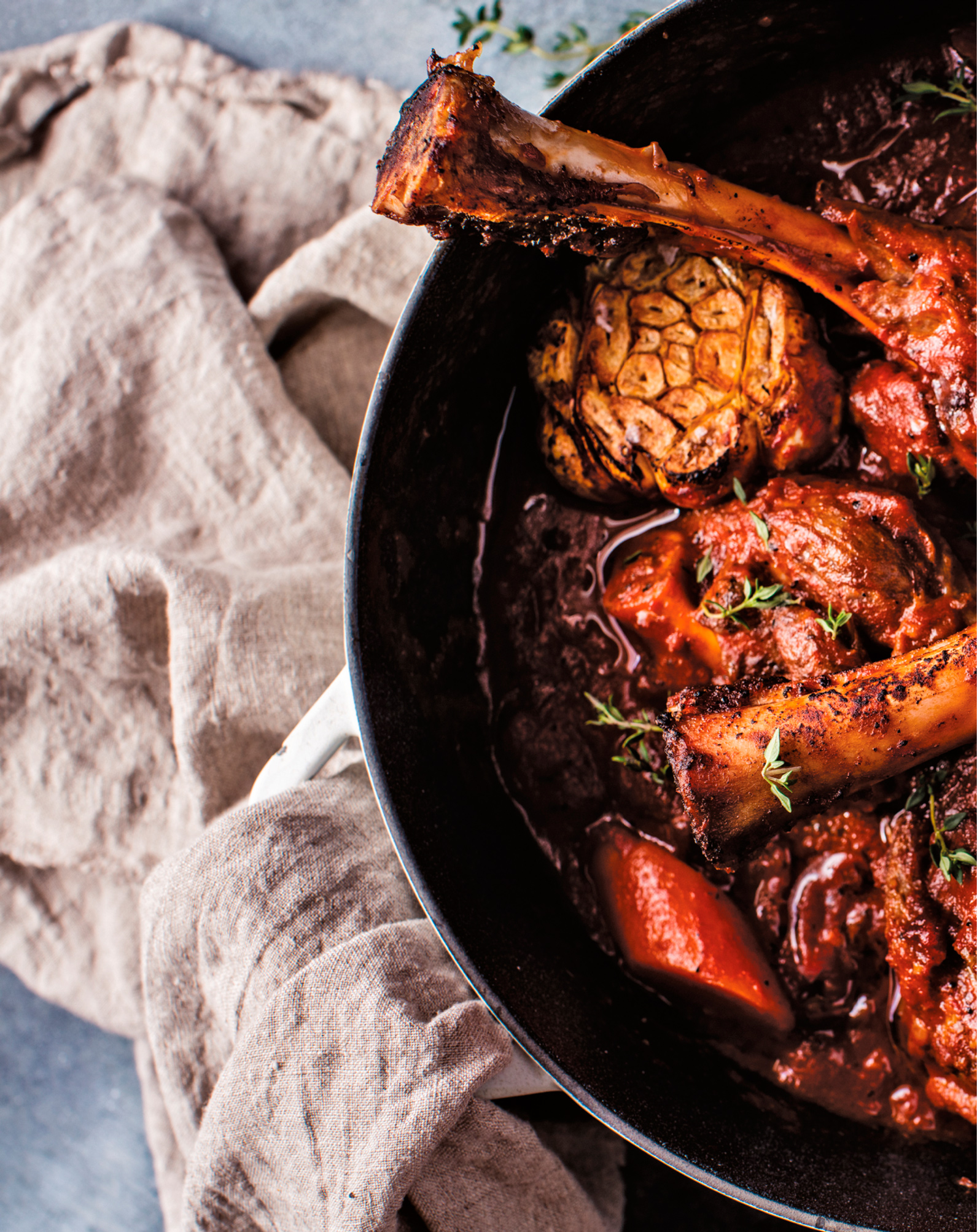

Root Vegetable and Sage Pesto Baked Salmon
Serves: 4

I have a confession: dishes are my worst nightmare. I do a lot of cooking, and when I cook, I always make a giant mess. I’m talking flour on the floor, dishes piled high, and anything from cheese to cherries to chocolate smeared on my face. When I’m not cooking for the blog, I still need to eat dinner. On these “computer” days, I don’t want to make a mess, but I do want to eat something simple and healthy. This one-pan salmon is the dinner I go for on these kind of nights. What I love about this recipe (other than the fact that cleanup is as easy as possible) is how versatile it is. In the summer, you can use fresh zucchini, bell peppers, and corn; in the fall and winter, root vegetables; and in the spring, asparagus, peas, and artichokes. The sage pesto is an awesome switch-up from the classic basil version, and I love how it pairs with the heartier root vegetables, but feel free to use basil in the warmer seasons. If you don’t love fish, use chicken breasts and bake for 25 to 30 minutes.
3 small beets, halved
2 carrots, chopped
1 small to medium sweet potato, diced
12 baby potatoes, halved if larger
12 Brussels sprouts, halved
2 tablespoons extra-virgin olive oil
Kosher salt and freshly ground black pepper
Sage Pesto
1 cup fresh sage leaves
1 cup baby kale
⅓ cup toasted pistachios
⅓ cup grated Parmesan cheese
½ cup extra-virgin olive oil
Kosher salt
Crushed red pepper flakes
4 (5- to 6-ounce) salmon fillets
¼ cup grated Manchego cheese
Fresh lemon juice (optional)
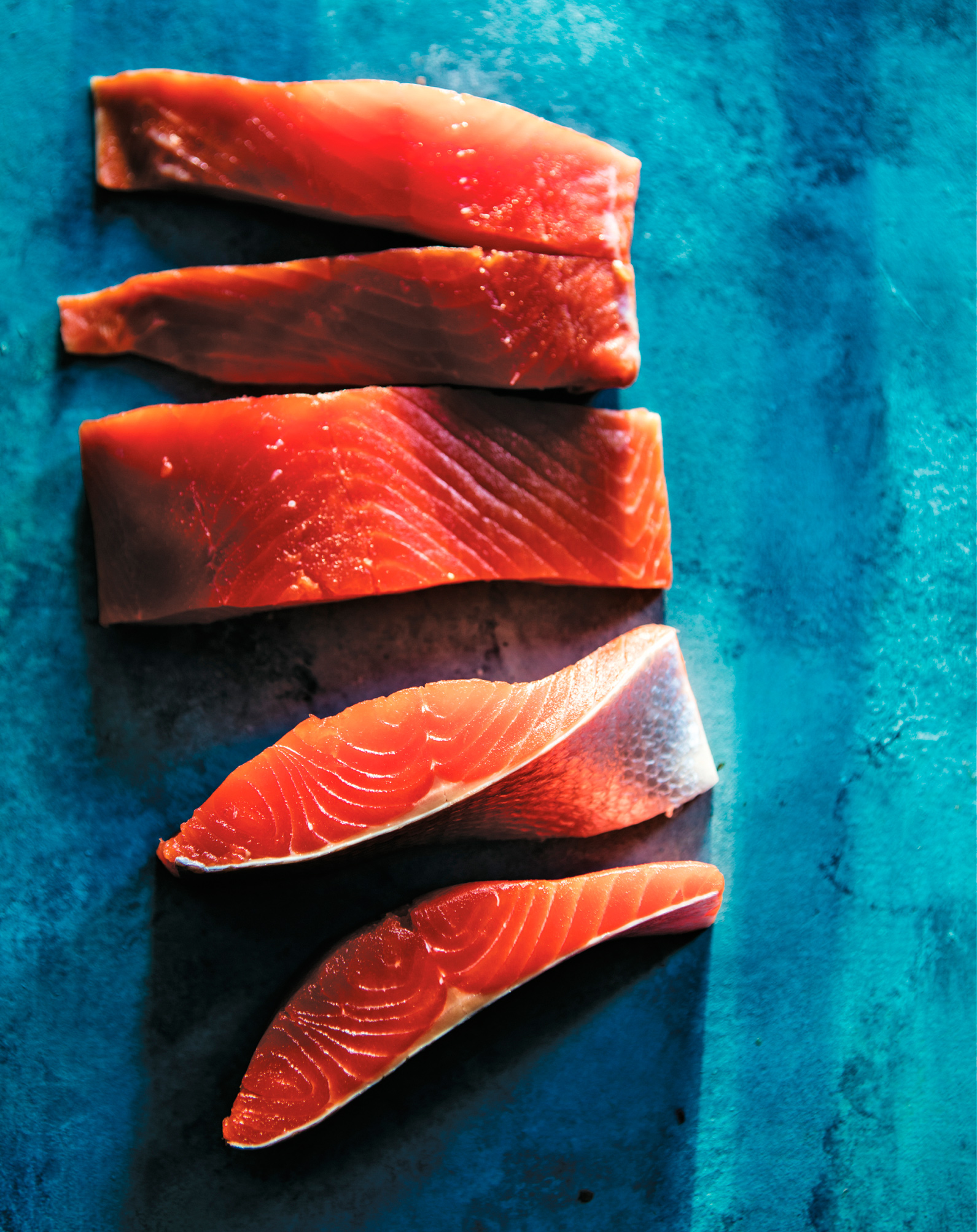
Drunken Late-Summer Corn and Clam Chowder
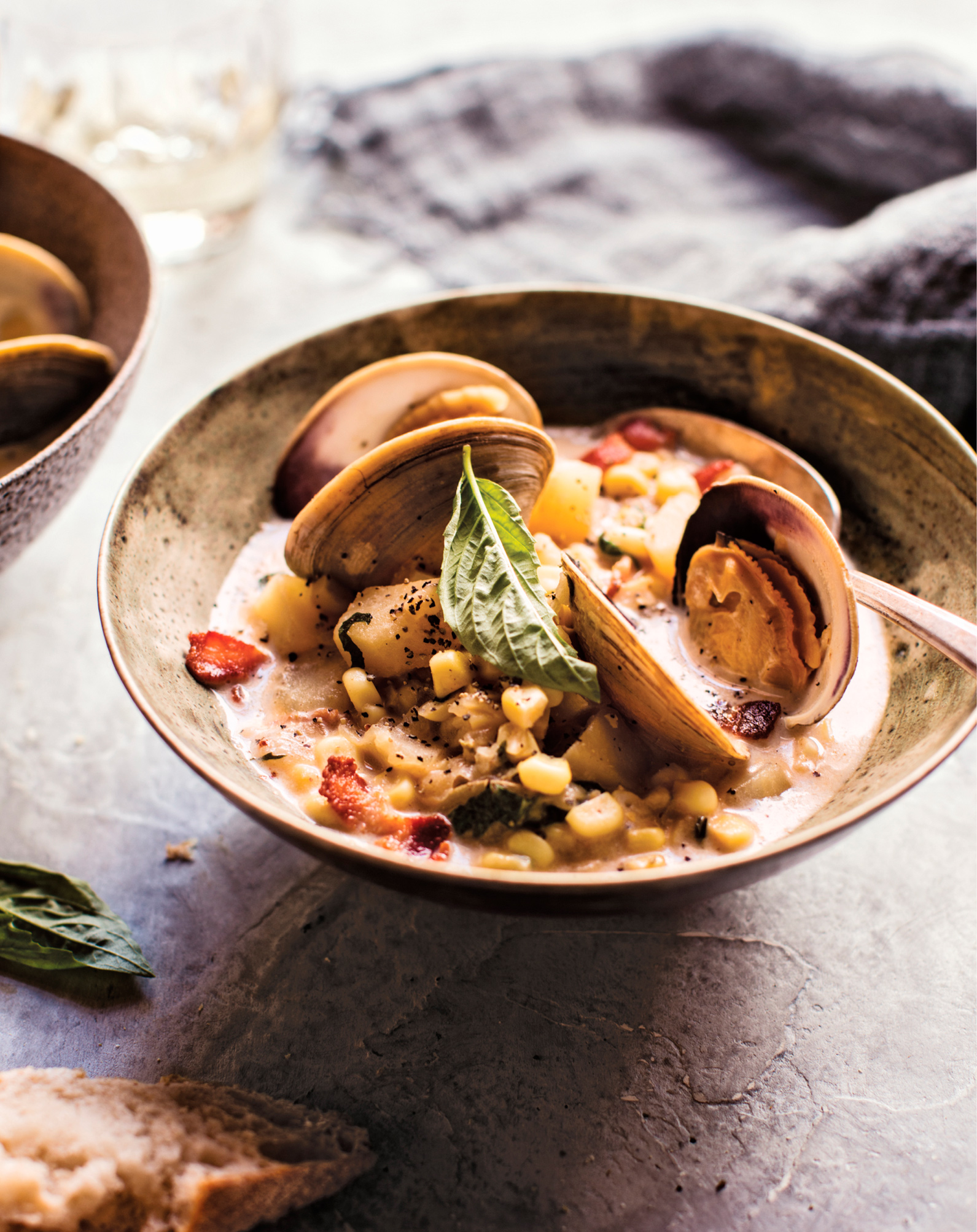
Serves: 4 to 6

Late summer is all about using up fresh garden produce: golden ears of sweet corn, perfectly ripe tomatoes, just-plucked basil. This soup does just that. The wine adds a rich flavor and pairs well with the clams. It’s a combo you can’t beat, and when finished with a handful of basil and garlic-herb toast for dipping, well, it’s the perfect way to send off summer and welcome the cooler days of fall. For added flavor, try grilling or broiling your corn before adding it to the soup.
4 thick-cut bacon slices, chopped
2 tablespoons salted butter
1 sweet onion, finely chopped
2 garlic cloves, minced or grated
2 sprigs fresh thyme
3 Yukon Gold potatoes, peeled and diced
1 cup white wine
2½ cups low-sodium chicken broth
¼ to ½ teaspoon cayenne
1 bay leaf
2 cups whole milk
16 to 20 littleneck clams, thoroughly washed and scrubbed clean
4 cups corn kernels
¼ cup fresh basil, chopped, plus more for serving
Shredded sharp white cheddar, for serving (optional)
Toasted French or sourdough bread, for serving (optional)
 NOTE
NOTE
Using raw lobster tails in place of, or in addition to, the clams is delicious. I either use 4 lobster tails to replace all the clams, or 2 lobster tails and about 10 clams.
Chipotle Tuna and Avocado Salad Pita

Serves: 2

This is one of the best quick, go-to healthy meals I have up my sleeve. You can throw it together in ten minutes or less, using mostly pantry ingredients. I like to use mashed avocado in place of mayo in my tuna salad, and then kick things up a notch with a chipotle pepper! If you’re feeling the need for a little cheese in your life, I’d be super excited if you turned this into a tuna melt…’cause adding cheese is never, ever a bad idea. And yes, I do it often.
1 ripe avocado, pitted
2 canned chipotle peppers in adobo, finely chopped
¼ cup oil-packed sun-dried tomatoes, drained and coarsely chopped
Juice of ½ lemon
2 (5-ounce) cans oil-packed tuna, drained
2 tablespoons chopped fresh basil
1 tablespoon chopped fresh oregano
Freshly ground pepper
2 pitas, warmed
2 butter lettuce leaves
Handful of fresh arugula
Handful of fresh microgreens
Jerk Mahimahi and Pineapple Salad with Ginger-Chile Vinaigrette

Serves: 4

It’s quite possible that I could live solely on pineapple and mango…and, okay, burrata, too. Whenever I’m in need of a little tropical flair, I make this salad. I have a pretty good imagination, so it lets me picture myself on a Caribbean island with a tropical, fruity drink in hand. Sounds kind of silly, but when you live in a place as cold as I do and there are only thirty nights out of the entire year that the temperature doesn’t drop below freezing, you need to use your imagination…and you also need a really great space heater. This jerk mahimahi is amazing. And when crusted with coconut, the spice gets an awesome layer of sweetness. The ginger-chile vinaigrette balances it all out.
Fish
1 pound skin-on mahimahi, cut into 4 pieces
¼ cup jerk seasoning, store-bought or homemade (recipe follows)
4 tablespoons extra-virgin olive oil
⅔ cup unsweetened shredded or flaked coconut
Salad
4 cups baby spinach
1 cup watercress
2 cups cubed fresh pineapple (see “How to Prep a Pineapple,” following)
1 cup halved cherry tomatoes
¼ cup fresh basil, coarsely chopped
¼ cup fresh cilantro, coarsely chopped
1 avocado, pitted, peeled, and sliced
⅓ cup unsweetened shredded or flaked coconut
1 cup fresh blueberries
Chile-Ginger Vinaigrette
¼ cup extra-virgin olive oil
2 tablespoons fresh orange juice
1 tablespoon cider vinegar
1 (1-inch) knob fresh ginger, peeled and grated
1 red Fresno chile, seeded and finely chopped
Kosher salt and freshly ground pepper
Fresh limes and pickled ginger, for serving
 HOMEMADE JERK SEASONING
HOMEMADE JERK SEASONING
Makes: ½ cup
1 tablespoon garlic powder
2 to 3 teaspoons cayenne
2 teaspoons dried thyme
2 teaspoons kosher salt
1 teaspoon ground all-spice
½ teaspoon freshly ground black pepper
½ teaspoon crushed red pepper flakes
½ teaspoon ground cinnamon
Put all the ingredients in a glass jar and shake to combine. Store at room temperature for up to 6 months.
Quick Kickin’ Cajun Shrimp and Rice
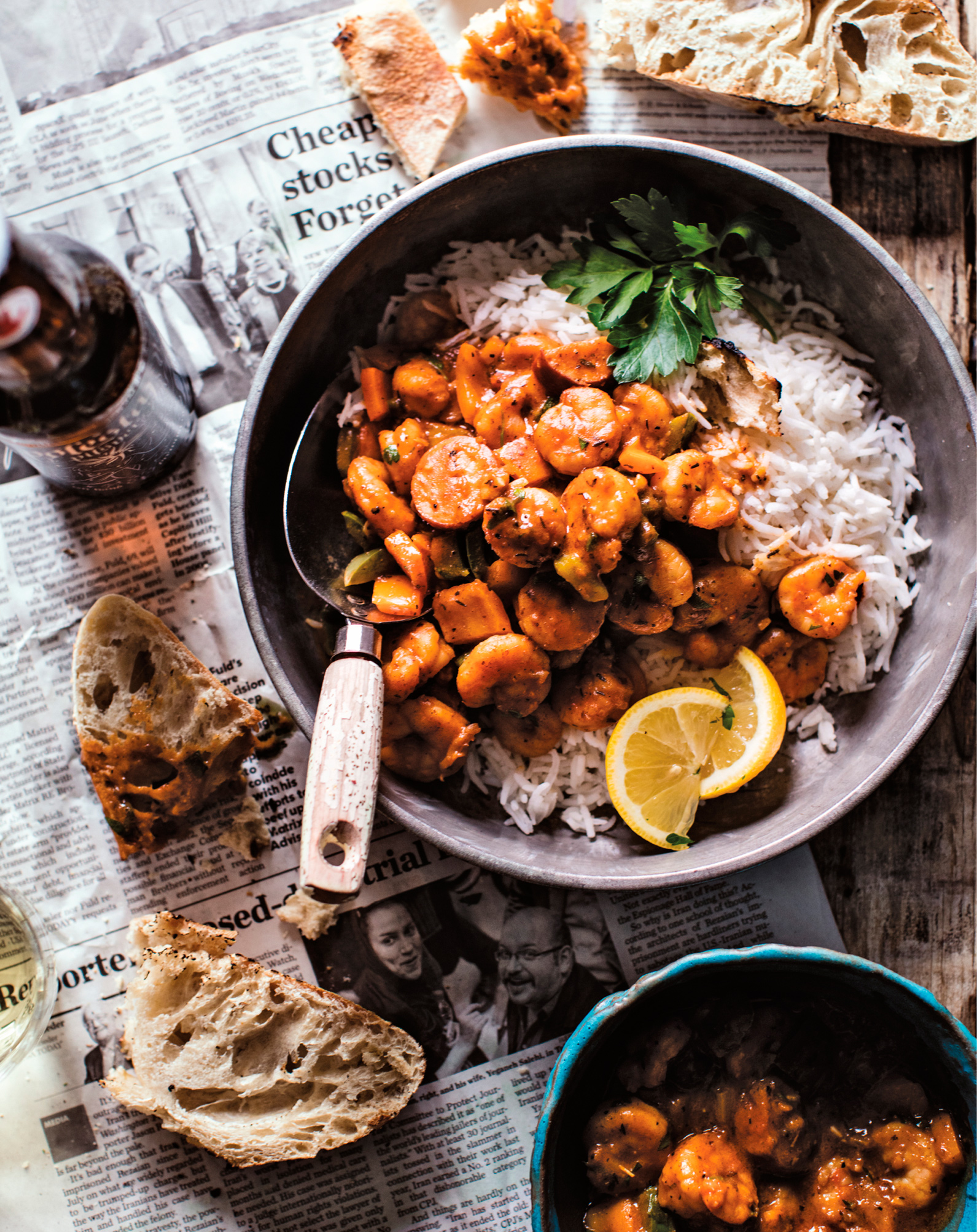
Serves: 4

Mrs. Mooney isn’t just famous for her penne (this page); she also makes a mean gumbo. Even those who don’t think they like Cajun food like Mrs. Mooney’s gumbo. Her version takes some time to put together, and it’s really best if you let it sit overnight before serving. It’s a great meal to make on a Saturday and eat on a Sunday. Sometimes I’m not that organized—I just need a good Cajun meal, and I need it fast! Enter this quick kickin’ Cajun shrimp and rice. I often make this on busy weeknights and serve it with my favorite beer bread (this page) alongside. It’s heavy on the flavor and light on the time commitment.
1½ cups jasmine or basmati rice
1 tablespoon Cajun seasoning
1 tablespoon Creole seasoning
1 teaspoon dried thyme
1 teaspoon smoked paprika
¼ teaspoon kosher salt, plus more as needed
¼ teaspoon freshly ground pepper, plus more as needed
2 andouille sausage links, sliced
2 tablespoons salted butter
1 pound shrimp, peeled and deveined
¼ cup all-purpose flour
¼ cup canola oil
1 green bell pepper, chopped
1 cup cubed fresh pineapple (see “How to Prep a Pineapple,” this page)
2 garlic cloves, minced or grated
1 (12-ounce) bottle beer (use whatever you like to drink)
2 tablespoons sweet Thai chili sauce
1 tablespoon Louisiana-style hot sauce
1 tablespoon Worcestershire sauce
Handful of fresh parsley, chopped, plus more for serving
Lemon wedges, for serving
Beer and Harissa–Steamed Mussels with Parmesan Fries

Serves: 2 to 4

I could eat mussels every day. They’re quick and easy, but so mouthwateringly good. I like to serve these in late summer and into fall when mussels are at their best. They are really fun for small gatherings with friends, because unlike chicken or steak, you really can’t mess up mussels. You just need to be sure there is plenty of butter (never too much butter), booze (for both cooking and drinking), and carbs (to soak up all the yummy sauce), and you’re good to go. Mussels may be meant as more of an appetizer than a full-on meal, but come on, we all know we’re going to fill up on them anyway…especially when there are Parmesan fries involved. Yep, best kind of dinner there is!
Parmesan Fries
4 russet potatoes, cut into ¼-inch-wide matchsticks
¼ cup extra-virgin olive oil
2 tablespoons chopped fresh basil, plus more for serving
1 tablespoon flaky sea salt
½ cup grated Parmesan cheese
Mussels
2 tablespoons coconut oil
2 tablespoons salted butter
½ sweet onion, finely chopped
2 garlic cloves, minced or grated
2 to 4 tablespoons harissa
1 teaspoon smoked paprika
Kosher salt and freshly ground pepper
12 ounces beer or white wine (use whatever you like to drink)
½ cup canned full-fat coconut milk
2½ pounds mussels, debearded and scrubbed clean
1 cup cherry tomatoes
1 (14-ounce) can chickpeas, drained and rinsed
¼ cup chopped fresh cilantro, plus more for serving
¼ cup chopped fresh basil, plus more for serving
Blackened Mahimahi Tacos
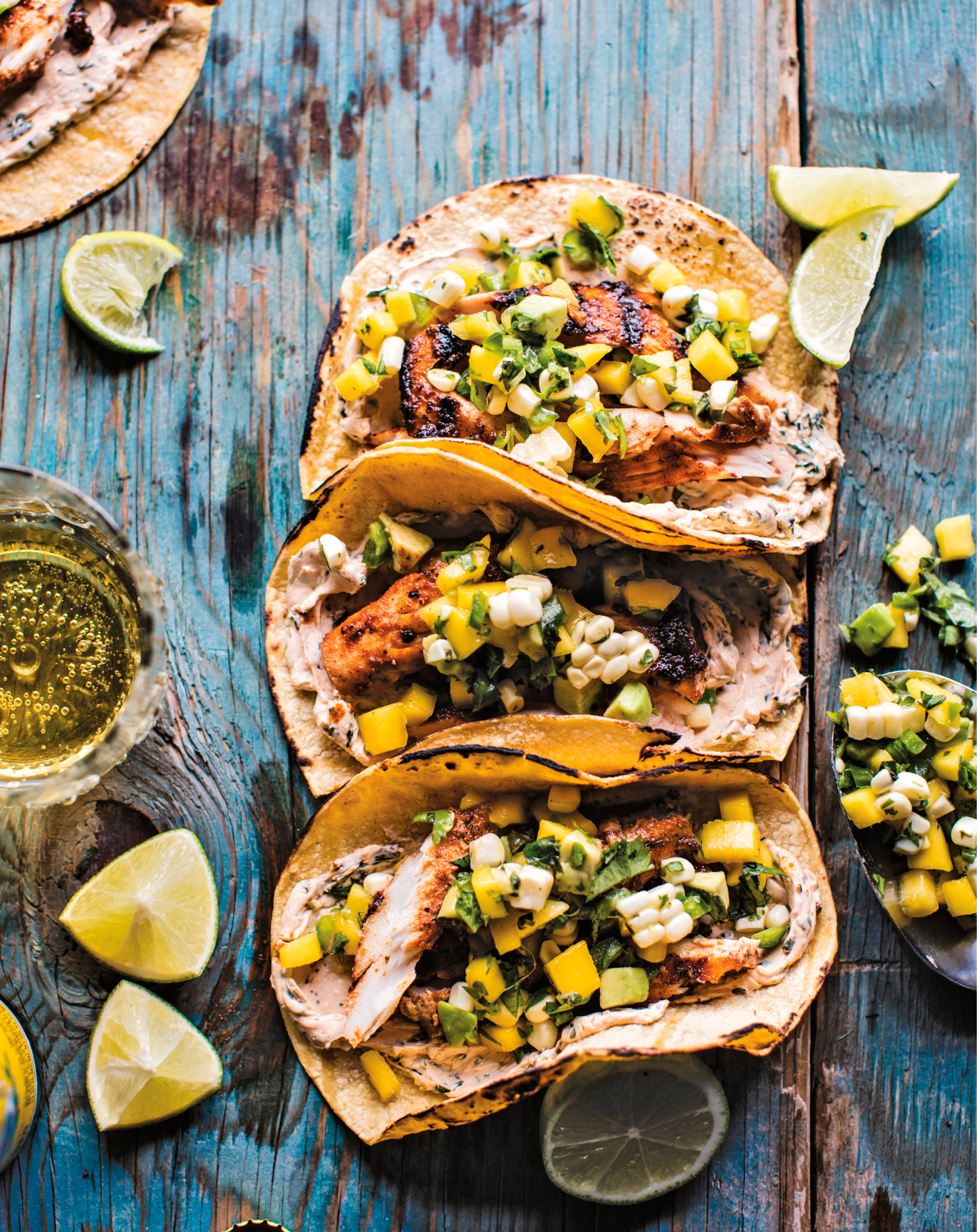
Serves: 4

When I was a kid, my family would eat beef tacos twice a week. No, really—twice a week. Mom and I ate them with a hard shell and cheddar cheese, while most of the boys had their tacos in a soft flour tortilla (Dad wasn’t into tacos at all). Occasionally, there was lettuce on the table, too, but no one really touched that. As I got older and became more aware of the foods my family and I were eating, our weekly tacos started to change. First, I began using ground turkey in place of beef. Then I started making my own seasoning mix. And then I got really adventurous and started making my own taco shells. When my older brother Brendan suggested that I try making fish tacos, I was wary—but I gave it try and have never looked back.
1 tablespoon light brown sugar
1 tablespoon paprika
½ teaspoon cayenne
½ teaspoon garlic powder
½ teaspoon dried thyme
1 teaspoon kosher salt
1 teaspoon freshly ground pepper
1½ pounds mahimahi
Extra-virgin olive oil
1 (8-ounce) package cream cheese, at room temperature
8 corn or flour tortillas, warmed
Mango Salsa (this page; see Note)
Chopped fresh cilantro, for serving
Lime wedges, for serving
 NOTE
NOTE
If you have leftover mango salsa, it’s great on a variety of dishes. You can spoon it over grilled meats and seafood, use it in salads, or serve it as an appetizer with tortilla chips for scooping. It’s also surprisingly delicious when served over a block of feta cheese that’s been drizzled in olive oil, or even as a topping for baked Brie.
Pan-Fried Sesame-Crusted Tilapia

Serves: 4

Light, white tilapia tends to be a bit boring, but think of it as a canvas to take on a variety of flavors. Trust me, there is nothing boring about this Asian-inspired tilapia. The fish is glazed in a sweet-and-spicy sauce, served over soba noodles, and topped with crunchy fried wontons for a little fun and texture. Honestly, you really can’t go wrong with flavors like these. And don’t think those fried wontons are optional… because balance is the key to life!
⅓ cup low-sodium soy sauce
¼ cup honey
2 tablespoons fresh lemon juice
1 tablespoon sriracha sauce
1 (1-inch) knob fresh ginger, peeled and grated
1 garlic clove, minced or grated
12 ounces soba noodles
½ cup fresh basil, coarsely chopped
¼ to ½ cup grated Parmesan cheese
4 (4- to 6-ounce) tilapia fillets
Kosher salt and freshly ground black pepper
¼ cup mixed black and white sesame seeds
3 tablespoons sesame oil
1 bunch asparagus spears, tough ends trimmed
½ teaspoon crushed red pepper flakes
For Serving
Sliced avocado
Sliced cucumber
Pickled ginger
Wonton Crisps (recipe follows)
 WONTON CRISPS
WONTON CRISPS
Serves: 4
Canola or vegetable oil, for frying
20 to 40 wonton wrappers
Kosher salt
Lime zest
Fill a large skillet with about 1 inch of oil and heat over medium. When it shimmers, add the wonton wrappers a handful at a time. Fry until golden, about 1 minute. Remove with a slotted spoon and drain on a paper towel–lined plate. Season immediately with salt and lime zest. Repeat with the remaining wrappers.
Lobster BLT

Serves: 4

BLTs are classic. You really can’t mess them up. The addition of buttery lobster to this sandwich is possibly one of the best ideas ever. Lobster and bacon just go together—like two peas in a pod. Add fresh tomatoes, butter lettuce, fontina cheese, and sweet chili butter, and you’ve got one tasty sandwich. BLT or seafood purists may look down on me for adding cheese, but I’m not concerned. If they only tried this, they would be convinced it’s okay, and it’s necessary.
6 tablespoons (¾ stick) salted butter
1 to 2 tablespoons sweet Thai chili sauce
1 tablespoon extra-virgin olive oil
2 to 4 lobster tails, meat removed and patted dry
8 slices sourdough bread
1 cup shredded fontina cheese
⅓ cup sriracha mayo (see Note)
4 butter lettuce leaves
2 heirloom tomatoes, sliced
1 avocado, pitted, peeled, and sliced
8 bacon slices, cooked
 NOTE
NOTE
The recipe calls for sriracha mayo, which is easy to throw together: just mix 1 to 2 tablespoons of sriracha sauce into ¼ cup of mayo. You can also use plain mayo in a pinch. I actually don’t love mayo, so I make a sriracha-tahini sauce, too, just subbing tahini for the mayo and slowly adding water until the consistency is right.
Garlic Lemon Butter Shrimp
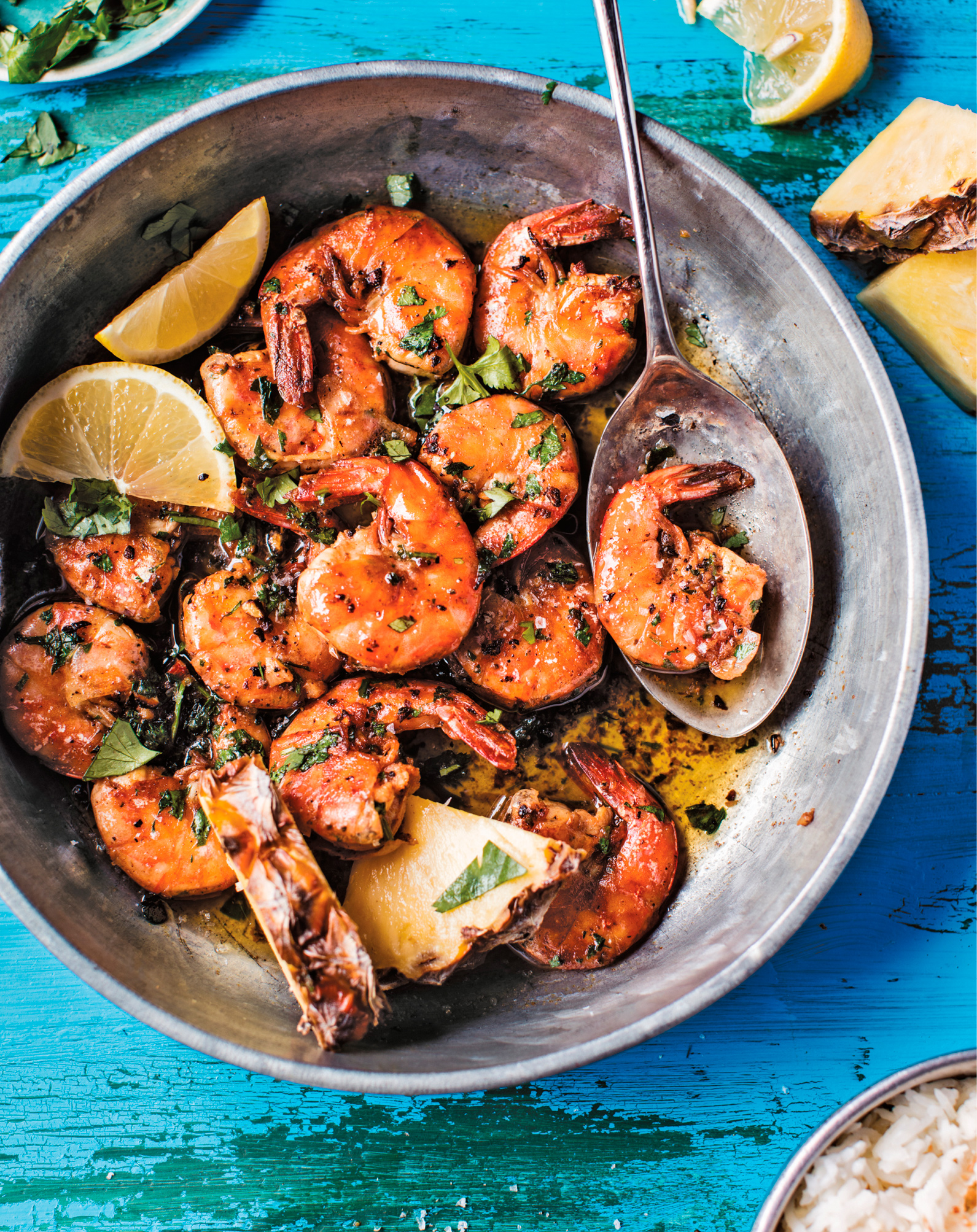
Serves: 4

There are not enough words to describe just how good this plate of food is. If you’ve ever traveled to Hawaii, you may know about the very famous shrimp trucks that sell garlic lemon butter shrimp daily on the shores of Oahu. Sadly, I’ve never actually visited these trucks, only read about them, looked at photos of them, and researched all about their shrimp and just how they make it. Still, I feel pretty confident in my recipe. It’s essential that you serve this shrimp with a big side of rice for soaking up any sauce, plus plenty of fresh pineapple wedges. In Hawaii, they serve the shrimp shell on, tail on. The idea is that you suck the butter sauce off the shells and then remove the shell and eat the shrimp. If all you really want to do is just eat the shrimp with zero interruptions (I get that), simply peel the shrimp before marinating, but leave the tail on for easy eating.
1 pound shell-on, tail-on raw shrimp
¼ cup extra-virgin olive oil
Juice of 1 lemon
6 garlic cloves, minced or grated
1 tablespoon chopped fresh parsley
½ teaspoon cayenne
Coconut Rice
1 (14-ounce) can full-fat or lite coconut milk
1 cup basmati rice
¼ cup unsweetened shredded or flaked coconut
Hawaiian sea salt (alaea) or kosher salt
Kosher salt and freshly ground pepper
6 tablespoons (¾ cup) salted butter
1 tablespoon chopped fresh parsley, plus more for serving
Zest and juice of ½ lemon
Pineapple wedges and lemon wedges, for serving
Seafood Bánh Mì
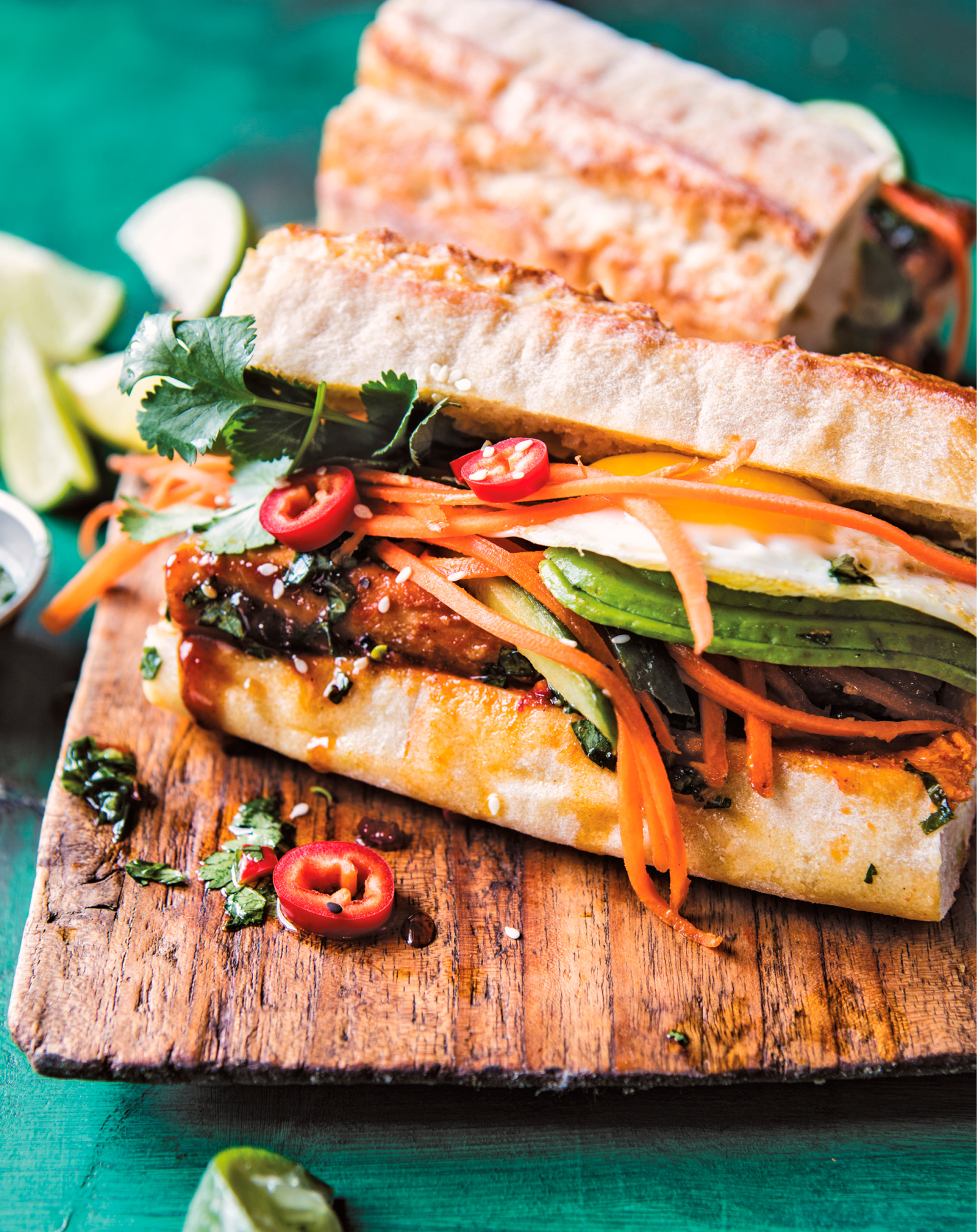
Serves: 4

While I do love the classic bánh mì, this seafood version is pretty incredible. I took the bones of the traditional Vietnamese sandwich—meat, cilantro, cucumber, pickled carrots, radish—and turned it into my own little sweet-and-spicy creation, complete with caramelized fish, Thai basil chimichurri, a fried egg, and sliced avocado.
Thai Basil Chimichurri
1 cup chopped fresh Thai basil or regular basil
¼ cup chopped fresh cilantro
⅓ cup extra-virgin olive oil
¼ cup red wine vinegar
1 garlic clove, minced or grated
1 red Fresno chile, seeded and chopped
1 teaspoon kosher salt
Fish
½ cup honey
Juice of 1 lime
1 red Fresno chile, seeded and chopped
2 tablespoons fish sauce
Freshly ground pepper
3 tablespoons sesame oil
1 pound white fish, such as mahimahi or tilapia, skin removed
2 to 3 tablespoons Thai red curry paste
6 tablespoons (¾ stick) salted butter, at room temperature
1 French baguette, toasted and cut into quarters
1 cup shredded fresh or pickled carrots
1 cucumber, thinly sliced
1 avocado, pitted, peeled, and sliced
4 fried eggs
Toasted sesame seeds, basil leaves, and sliced red Fresno chiles, for garnish
Cedar Plank Salmon with Lemon Butter
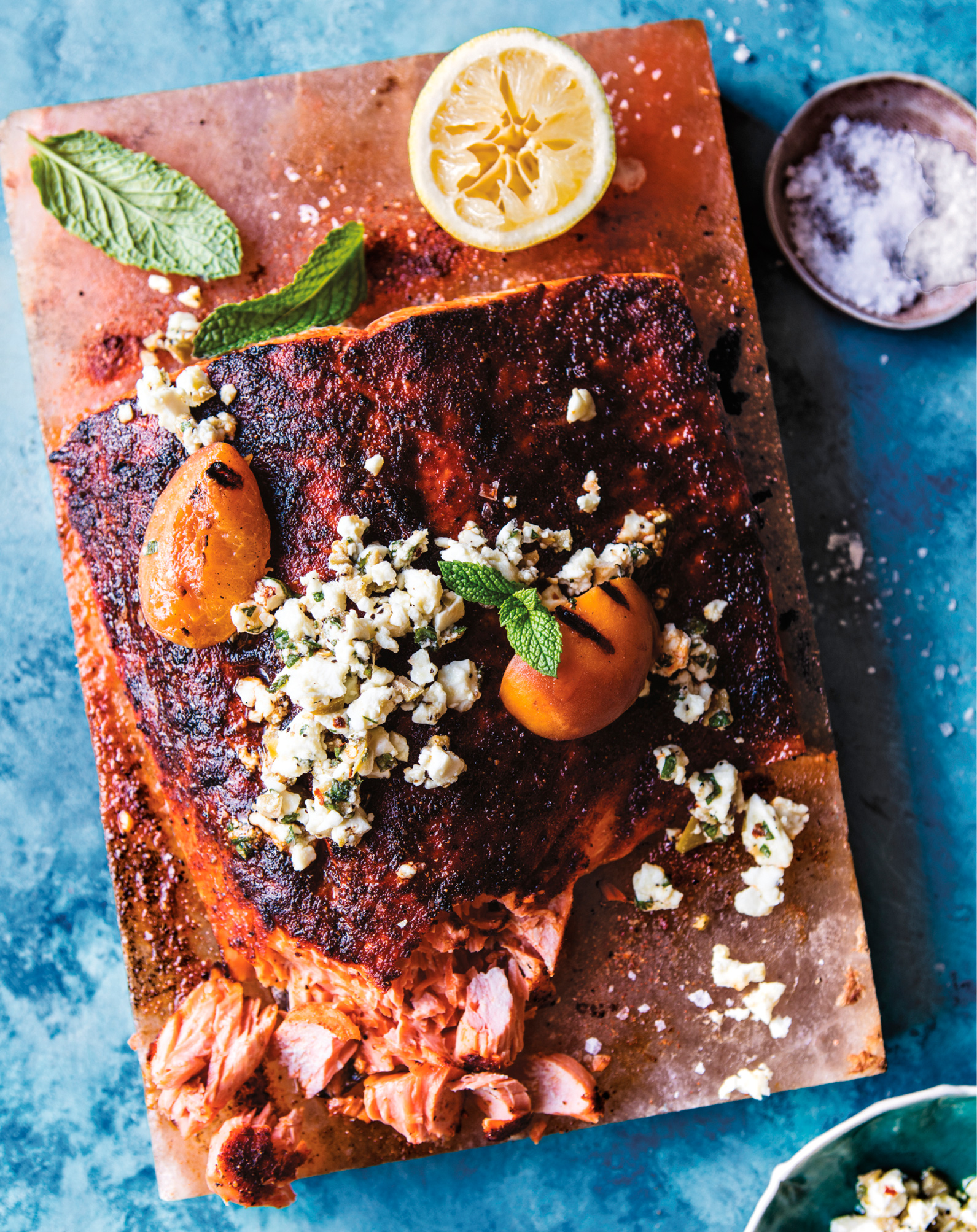
Serves: 4

If I had my way, grilling on a cedar plank would be my sole way of cooking fish. Obviously, that lovely stuff called snow and rain make that impossible, but I always do it when I can. Using a cedar plank gives your fish great flavor, and it makes cooking and cleanup super easy, too. If you just can’t wait for those summer months (I know I can’t!), you can make this on a grill pan.
White wine or water, for soaking
1 tablespoon smoked paprika
2 teaspoons ground cumin
½ teaspoon ground cinnamon
½ to 1 teaspoon cayenne
Kosher salt and freshly ground pepper
1 whole salmon fillet (about 2 pounds), skin removed
Extra-virgin olive oil
1 tablespoon honey
6 ripe apricots, nectarines, or peaches, halved and pitted
6 tablespoons (¾ stick) salted butter, at room temperature
Zest of ½ lemon
Minted Feta and Green Olive Salsa (this page)
 NOTE
NOTE
You can also make this salmon on a baking sheet under the broiler. Cook for 6 to 8 minutes, or until the salmon is opaque and flakes easily with a fork.
Triple-the-Fish Seafood Hot Pot with Herb Toast
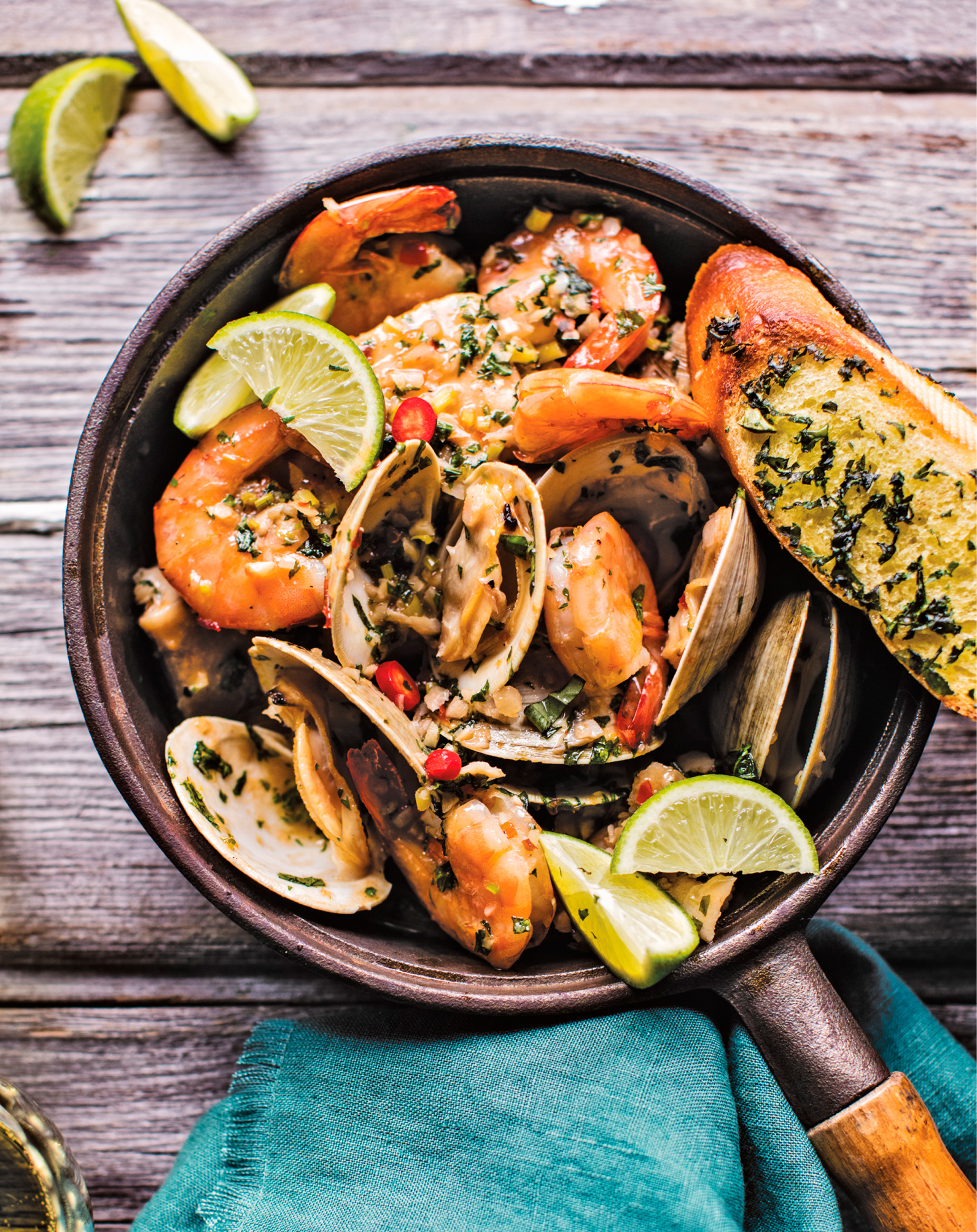
Serves: 4

Decisions are my worst nightmare. I hate making them; I truly avoid them at all costs. Especially big ones—I tend to sit on them for days and days until I’m finally forced to commit one way or the other. Well, this recipe was born out of pure indecisiveness. I could not decide whether I wanted clams, shrimp, lobster, or mahimahi, so I just threw them all into one big pot with some butter…okay, a lot of butter…and called it a day. Turns out, that was actually a pretty great call, because this recipe has turned into one of my favorites. It’s fast-cooking, very simple, and really tasty! The clams and shrimp are a must, but the mahimahi can be subbed for salmon or lobster tails. It really just depends on what you are feeling, what you have available, or maybe what your budget allows. Some kind of toast is pretty essential here, but serving this with fries would be equally amazing.
Herb Toast
6 tablespoons (¾ stick) salted butter, at room temperature
1 tablespoon chopped fresh parsley
1 tablespoon chopped fresh basil
1 tablespoon chopped fresh cilantro
6 to 8 (1-inch-thick) baguette slices
Fish
4 tablespoons (½ stick) salted butter
¼ cup coconut oil
8 clams, scrubbed
8 shell-on jumbo shrimp
1 pound mahimahi or salmon, cut into 2-inch pieces, or lobster tails
6 garlic cloves, minced or grated
1 stalk lemongrass, tender white inner core only, minced
2 tablespoons fish sauce
¼ cup sweet Thai chili sauce
Juice of 1 lime
¼ cup chopped fresh basil
¼ cup chopped fresh cilantro
Cheesy French Scallops

Serves: 4

Cheesy. French. Scallops. How can you go wrong when words like these are involved? Really, you can’t. This recipe is decadent; there’s no denying that. The croissants add a real wow factor, and the creamy white wine sauce is what all scallops should be sitting in. I highly recommend serving this to anyone you are trying to impress (I’m talking future mothers-in-law, bosses, boyfriends, etc.). The moment they sink their teeth into these melt-in-your-mouth scallops, you’ll become their very favorite person. Well, that might be a tad dramatic, but give it a try. I like to serve this with my Crunchy Roasted Broccoli (this page).
¼ cup all-purpose flour
8 large fresh sea scallops
Kosher salt and freshly ground black pepper
4 tablespoons (½ stick) salted butter
½ sweet onion, finely diced
2 garlic cloves, minced or grated
⅔ cup white wine
½ cup heavy cream
1 bay leaf
2 or 3 sprigs fresh thyme, plus more leaves, if desired, for garnish
½ teaspoon crushed red pepper flakes
2 large croissants, halved horizontally
1½ cups shredded Gruyère cheese
